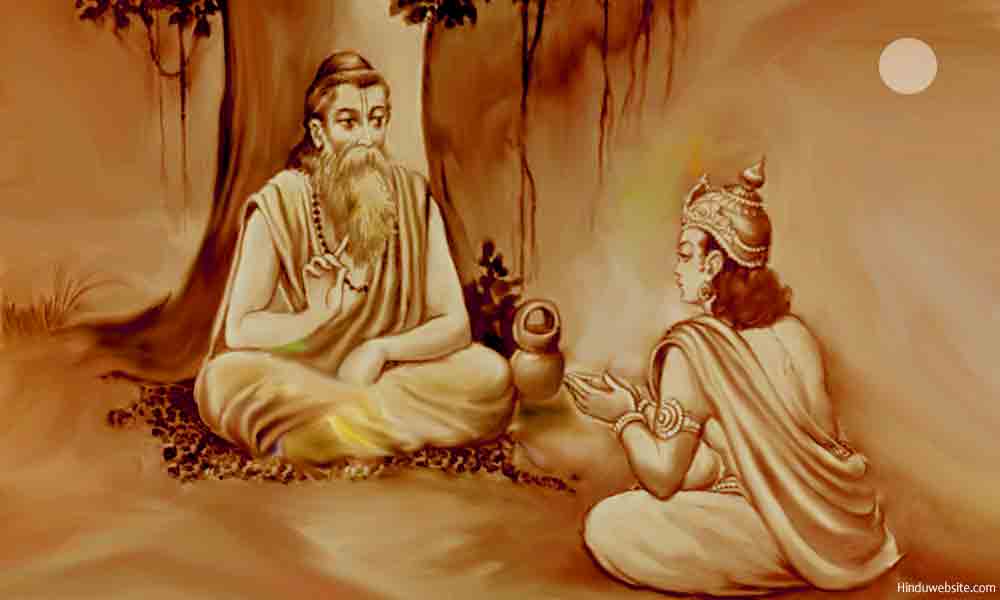
Ashtavakra Samhita, Chapter 1, Verse 1

Contents
Index, Verse 1, Verse 2, Verse 3, Verse 4, Verse 5, Verse 6, Verse 7, Verse 8, Verse 9, Verse 10, Verse 11, Verse 12, Verse 13, Verse 14, Verse 15, Verse 16, Verse 17, Verse 18, Verse 19, Verse 20
Verse1
Kathamjnanam avapnoti katham
muktibhavishyati
Vairagyam ca katham praptametad bruhi mama prabho
Translation
Janaka said, how people acquire knowledge, how liberation happens, how renunciation is attained, please explain to me O great lord!
Explanation
Questions for contemplatin
Knowledge in this context is the knowledge of the Self. Liberation means liberation from mortality and impermanence or from the cycle of births and deaths. Renunciation means renunciation of desires. The great lord is the spiritual master, Ashtavakra. The person who addressed him was King Janaka in his role as a disciple. It requires a lot of humility by a king to address another one as a lord.
The sloka introduces five important factors that are essential for spiritual life, a spiritual guru, an earnest disciple, knowledge of self, renunciation of desires and worldly pleasures, and interest in liberation from mortality.
Knowledge begins with inquiry. You must have either the curiosity or the desperation to know. An enlightened teacher is like a treasure trove of knowledge. Meeting him, and having an opportunity to speak to him personally to seek knowledge are blessing will happen only if you earn good karma. When you come into his presence, you can take whatever you want from him, as if you are plucking ripe fruit from an ancient tree. He will give you knowledge according to your questions and your curiosity, within the set of rules and code of conduct that guide the relationship between a teacher and student.
Ancient gurukulas encouraged students to ask questions and seek answers. Unless a student expressed his desire to know, the teacher would not accept him as his student. It was the tradition.
Even when knowledgeable people and renowned masters like Uddalaka Aruni or Svetaketu wanted to learn from others, they used to approach them with humility and requested them to teach. Although the conversation between Janaka and Ashtavakra was most likely an imaginary conversation, the scripture follows the same classical example and begins with questions.
The questions asked by Janaka are very pertinent to liberation. It is important to know how spiritual knowledge arises. Does it arise on its own or do you need to make an effort? We know that to acquire worldly knowledge we have to make effort. We have to study books, consult people, make observations and draw conclusions. Do we have to follow the same strategy for spiritual knowledge also?
Knowledge is the key. Without it the other two are not possible. To practice devotion, perform actions, or follow the path of renunciation you need right knowledge. Without it, liberation is not possible. You need to make an effort to acquire knowledge and allow the knowledge to come to you by controlling your desires and expectations and keeping your mind open in a state of aspiration.
Suggestions for Further Reading
- Om, Aum, Pranava or Nada in Mantra and Yoga Traditions
- Brahmacharya or Celibacy in Hinduism
- Atheism and Materialism in Ancient India
- Solving the Hindu Caste System
- How To Choose Your Spiritual Guru?
- Creation in Hinduism As a Transformative Evolutionary Process
- Wealth and Duty in Hinduism
- Do You Have Any Plans For Your Rebirth or Reincarnation?
- Understanding Death and Impermanence
- Lessons from the Dance of Kali, the Mother Nature
- Letting your God live in You - The True Essence of the Hindu Way of Life
- prajnanam brahma - Brahman is Intelligence
- Maslow's Hierarchy Of Needs From The Perspective Of Hinduism
- The Definition and Concept of Maya in Hinduism
- The Meaning of Nirvana
- Self-knowledge, Difficulties in Knowing Yourself
- Hinduism - Sex and Gurus
- The Construction of Hinduism
- The Meaning and Significance of Heart in Hinduism
- The Origin and Significance of the Epic Mahabharata
- The True Meaning of Prakriti in Hinduism
- Three Myths about Hinduism
- What is Your Notion of God?
- Why Hinduism is a Preferred Choice for Educated Hindus
- Essays On Dharma
- Esoteric Mystic Hinduism
- Introduction to Hinduism
- Hindu Way of Life
- Essays On Karma
- Hindu Rites and Rituals
- The Origin of The Sanskrit Language
- Symbolism in Hinduism
- Essays on The Upanishads
- Concepts of Hinduism
- Essays on Atman
- Hindu Festivals
- Spiritual Practice
- Right Living
- Yoga of Sorrow
- Happiness
- Mental Health
- Concepts of Buddhism
- General Essays